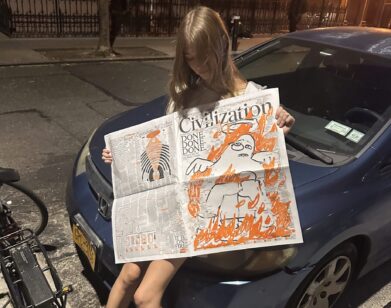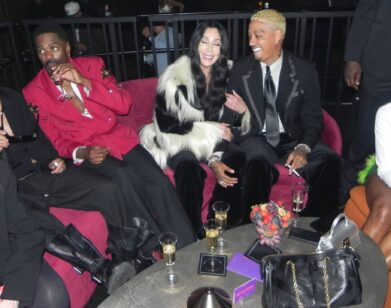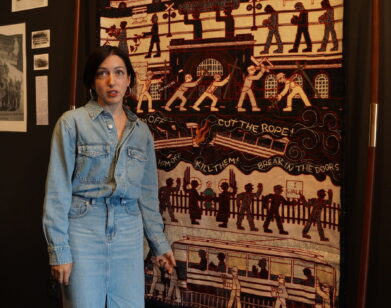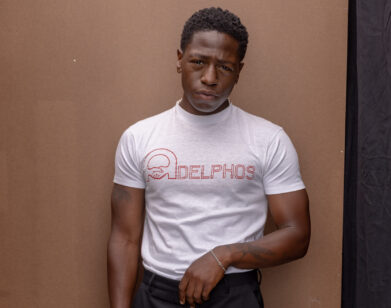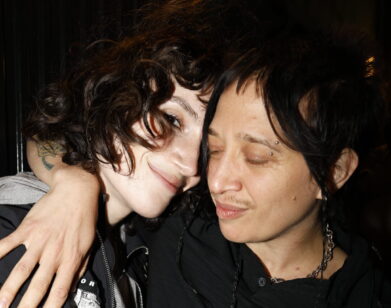Alessandro Nivola Gives Testimony
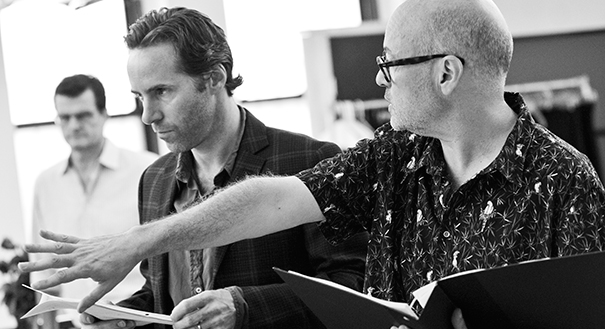
ABOVE: ALESSANDRO NIVOLA (LEFT) AND LINDSAY POSNER. PHOTO COURTESY OF JENNY ANDERSON.
“I’m the only person in the cast who has kids and so I’m at a real handicap,” laughs Alessandro Nivola. “The only place that I can sleep uninterrupted is in my dressing room.” The actor needs his beauty rest—last Thursday, The Roundabout’s new production of The Winslow Boy opened on Broadway, and Nivola plays Sir Robert Morton, London’s leading barrister circa 1913 and a man with a propensity towards theatrics. “People think that it’s going to be a polite living-room drama, kind of dusty and old, and then are pleasantly surprised when the show is so good,” he adds.
Written by British playwright Terence Rattigan in 1946, The Winslow Boy was inspired by a real incident: a young teen boy expelled from naval college for stealing a five-shilling postal order. Convinced of his son’s innocence and determined to defend the family’s honor, the boy’s father brought the case to court. “Rattigan has had an interesting trajectory in terms of his being appreciated in the UK,” Nivola explains. “He was such a popular player in the ’40s, and then when the angry young men arrived in the ’50s—Harold Pinter and John Osborne and that whole group—he just overnight became so unfashionable and uncool.”
Nivola fits into an enviable niche of actors. He works consistently between film and theater, and in high-quality projects. After The Winslow Boy closes at the beginning of December, Nivola will appear in David O. Russell’s American Hustle with Amy Adams (whom he acted with in Junebug) and Bradley Cooper (whom he has acted with on stage), and in The Devil’s Knot with Colin Firth and Reese Witherspoon. He also produced the upcoming miniseries Doll & Em, which stars his wife, actress Emily Mortimer.
EMMA BROWN: What do you do backstage before you come on?
ALESSANDRO NIVOLA: Obviously I’m on a different schedule than everyone—I have now clocked it at an hour before I walk onstage after the curtain rises. So around the time that everyone is kind of bustling around in the wings about to walk on, I stroll past them in my bathrobe and ascend the three flights of stairs to the showers. I have a leisurely shave and then warm my voice up in a nice, steamy shower. I then make my way back down to my dressing room, I close the door, I turn the monitors off so that I can’t hear the play and I turn on music—sometimes The Beach Boys, sometimes the Blind Boys of Alabama. Sometimes Snoop Dogg makes his way in there. I slowly kind of hang out in my dressing room and get dressed and I usually go over the lines of my first scene once every night, because it’s so fast and so repetitive and it took me a really long time to memorize, so I’m constantly frightened that I’m going to forget them; and in fact, early on in the previews I did have a couple of moments where I was just staring at that kid with no idea what I was gonna say. [laughs] That’s my routine. Then I get my fancy white tie and tails and on I go.
BROWN: I like that Sir Robert Morton’s music is the Blind Boys of Alabama. Shouldn’t you be listening to a rousing symphony?
NIVOLA: I started that in the very beginning. I was trying to be faithful to something vaguely evocative of the play. I had Così fan tutte playing, and then I realized that it was doing me no favors.
BROWN: Are you not curious, when you turn the monitors off, what sort of audience is out there?
NIVOLA: In terms of whether they’re fun or they’re sort of more serious? No. The audiences have been so extremely different from one night to the next, and it really affects the play. The feeling of performing the play is just so different from night to night because the tone and the atmosphere of the play change so much depending on how much people laugh.
BROWN: People were laughing so much when I saw it.
NIVOLA: I think the night you saw it, if I remember it correctly, was a really raucous night. I think there may have been a smattering of people under the age of 85 there that night, which might have helped infuse the crowd with some vocal response. [laughs] There are some nights where it really feels like you can hear oxygen tanks filling and emptying. [laughs] When performing the play, it’s tempting to turn it into a farce more than it really naturally wants to be if an audience is giving you that kind of response, because it’s very hard for any actor to resist the opportunity for a laugh. But the play really is at its best when it’s balanced between its humor and its more emotional undertones. If I were to be backstage and hearing people laughing a lot early on in the play, I would feel that if at certain moments in my performance they didn’t laugh, I was failing. When I come out not knowing, I have no idea whether it’s just because they’re a quieter audience.
BROWN: Do you feel like the audience is older for this play than for most of the plays you’ve done?
NIVOLA: Not necessarily. I remember doing a play early on in my career at the Long Wharf Theatre. I had to do some monologue in the play at one point and I was alone on stage. I looked out into the house, and everyone in the house was asleep except someone’s seeing-eye dog that was sitting there and just totally riveted by my performance. [laughs] That was the only creature of any kind that was still awake in the theater.
BROWN: Was that demoralizing?
NIVOLA: Well, it was so absurd at that point that I could only laugh.
BROWN: Had you ever seen a production of The Winslow Boy before?
NIVOLA: No. Well, I’d seen both movies—there were two movies, one made in the ’40s with Robert Donat playing my part, who was the guy from The 39 Steps, and then another one that David Mamet adapted into a film in 1999 with Jeremy Northam playing my part. Both those guys played the role as a kind of classic leading man. It wasn’t until we got into rehearsals and I started to really know the play, and Lindsay Posner had just directed it in London so he really understood the play well, that I discovered that the character was not really a classic leading man at all but instead a kind of eccentric—somebody who was so emotionally crippled that he could barely function in the same room with the woman in the play that he’s really falling in love with. While that wasn’t what I had anticipated the role to be, it has turned out to be much more exciting to play than it would have been, I think. The emotional range that you can show on film always has to be dialed down just for the sake of not blowing the lens off the camera. But the way that I’ve been directed in this play and the way that it’s really written on the page, he’s much more someone who’s prone to bouts of rage and then extreme measures to recover from them. That’s what’s really made the performance enjoyable to play—his going back and forth between having his emotional life get the better of him despite all of his best efforts.
BROWN: I found the play to be really heartbreaking. Even though it’s so funny you know that, after the play ends, everyone is just going to go off and die in World War I.
NIVOLA: My friend Ethan Hawke came to the play and that was the first thing he said to me when he came backstage, exactly what you just said. But I don’t know how many people really clue into that when they watch the play. I mean, there are definitely allusions to it and obviously if you know when it’s set you know what’s coming, but it’s very kind of hidden in the play that that’s almost certainly what’s going to happen. The boy [the case was based on] died in World War I.
BROWN: You mentioned that Lindsay had just directed this play in London. Was it difficult to make the character your own when your director had another performance so fresh in his mind?
NIVOLA: I think it was difficult for our cast knowing that he had a hit with his other production—that just added pressure for us because we knew that they must have been doing something right and obviously we wanted to discover the play anew for ourselves. We assumed that he would have been watching us with the eyes of somebody who had just seen actors successfully play these characters and how could we ever not be disappointing to him. But it’s interesting, I don’t know how much of it was genuine, but he really seemed to us to be discovering the play for the first time. Maybe he was just really clever at disguising the fact that he knew the play so well, but it was comforting because it felt like he wasn’t just trying to churn out the same production.
BROWN: I know that you’ve played a lot of English characters before, but does your wife help you with your accent at all?
NIVOLA: I definitely read over it with her to make sure I wasn’t saying anything that sounded weird. There was one word, “testimony.” I have a line where I say, [in English accent] “I suggest your whole testimony is a lie.” And I was saying “testimahny.” But I think more than the accent, she’s been helpful with just details about the milieu of the family because she’s just so familiar with the world of the play and with the characters that populate it. Her father, John Mortimer, was a famous barrister himself and was similarly very theatrical in the courtroom. He has been in the back of my mind as I was thinking about the character. John’s dead now, unfortunately, because otherwise I would have flown over and spent some time with him and gone to visit the Old Bailey with him or something. But his style, his big theatrical way of conducting his cross-examinations, was definitely something that I wanted to incorporate into the character.
BROWN: Goodness, he must have been an intimidating father-in-law.
NIVOLA: His style was slightly different. All of his power came from his humor and his wit and so you couldn’t see him sort of really kind of screaming at anybody, but he would have kind of taken them down with extreme amounts of sarcasm and humor.
BROWN: Is your son old enough to come see the play?
NIVOLA: Yeah, he’s been already. He loved it. His biggest observation was how shiny my shoes were. [laughs] He’s a well-traveled theatergoer, and two and a half hours of Rattigan was nothing for him. He did six hours of Japanese Kabuki theater in Tokyo once. [laughs] I couldn’t believe it. He was only about six or something and he was just totally fascinated by these people that were speaking a different language. Of course the experience of going to the theater in Japan is totally different. Every hour or so you get up and you go and eat in the theater and then come back in for the next act.
THE WINSLOW BOY IS AT THE AMERICAN AIRLINES THEATRE IN NEW YORK THROUGH DECEMBER 1. FOR MORE INFORMATION, VISIT THE ROUNDABOUT THEATRE COMPANY’S WEBSITE.

